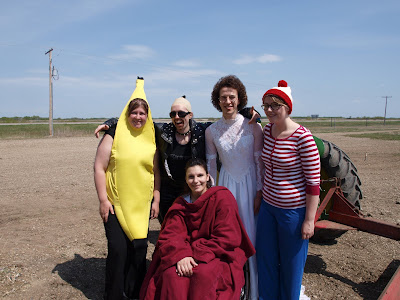 The following is a continuation of the debate between myself and a fellow blogger. You can read the beginnings of the debate here, watch the video that was responded to here, read the transcript of that video here and view the website of the man speaking in the video here.
The following is a continuation of the debate between myself and a fellow blogger. You can read the beginnings of the debate here, watch the video that was responded to here, read the transcript of that video here and view the website of the man speaking in the video here.In retrospect, I should not have just posted a video link without actually giving my perspective on the matter and saying which specific arguments in the video convinced me. I should have also specified that my problems with GE organisms were largely outside the scope of the scientific issues you tackled in your original post. Finally, I should have re-viewed the video before posting it because I hadn't seen it in a few months and didn't recall the exact content. Hopefully this response will clear things up.
Allow me to summarize your first post: “all natural” and “organic” are scientifically meaningless, genetic engineering is more efficient than artificial selection; genetic engineering results in lower production costs, fewer pest problems, reduced use of pesticides, and better yields; we need to be vigilant about the over-use of certain pesticides; overall, GE crops are good for people and the planet. I agree with every single point you make except for the conclusion that you reach (good for people and planet). How is it possible that we agree on all these facts and yet reach different conclusions? The answer is that you left out some very important questions about implementation in your analysis.
Unsurprisingly, the same types of greedy corporations that build showers that electrocute soldiers in Iraq and drill for oil without adequate safety measures or contingency plans also do shady things with GE crops that don't show up in scientific studies about crop production and profitability.
For starters, some GE companies sell “terminator seeds”. These seeds only produce one generation of plants because the seeds produced by the first generation are sterile. This is very harmful for impoverished farmers in the third world because they rely on saving seeds from the previous year's crop. Terminator seeds force them to return to agriculture companies year after year in order to buy new seeds. The companies' goal is not to feed the world more efficiently; they are only motivated by profit.
GE crops are patented and many can only be sprayed with patented pesticides that are produced by the same companies that make the seeds. This has resulted in a reduction of competition between pesticide manufacturers which means that the price of pesticide goes up and farming becomes a less viable way to make a living.
Another problem with the patenting of life that occurs with GE crops is that it results in multinational corporations enforcing their patents by suing farmers. Through no fault of their own, these farmers have their crops contaminated by airborne seeds or pollen from neighbouring fields. A famous case of this sort occurred in Canada to a man named Percy Schmeiser. Even though Mr. Schmeiser won his case in the end, he still had to endure a lengthy and expensive legal battle. Other farmers have not been lucky enough to have the resources to wage legal warfare with the army of lawyers employed by the biotech industry.
When one company's GE crop dominates a region then there is a drastic loss of genetic diversity. Genetic diversity is an important safe-guard against catastrophic crop failure due to disease, fungus or pests. Crop failure on a large enough scale could result in millions of deaths due to starvation.
GE crops have approximately the same nutritional value as conventional crops. Unfortunately, selective breeding in conventional crops is guilty of causing our food to be less nutritious than it once was. For the entire history of agriculture, plants have been bred for their resistance to environmental factors, quick growth, pleasing appearances and ease of transportation. The most important thing that genetic engineers should be worried about is making sure that the food we eat is more nutritious; not just heartier, bigger and more attractive.
I emphatically agree with you when you say, in summarizing the original post, that “science isn't the enemy.” You've outlined several arguments that demonstrate that there are clear advantages to using GE foods and that the labels 'all natural' and 'organic' rely on consumer ignorance of the naturalistic fallacy. However, while science isn't the enemy, it also isn't the panacea that some make it out to be. Science needs to be reigned in by sound legislation and rigorous regulation in order to protect the environment and future generations of humanity. Despite the fact that his rhetoric is a little over the top and many of his facts related to the science of GE crops are questionable at best, Mr. Smith's recommendations to only grow GE crops indoors and to end the practice of patenting life seem quite reasonable to me. He encourages us to be vigilant of both the scientific and economic dangers involved with GE crops. What better ways could there be to assure cautious progress?
P.S. Spider-goat FTW!



